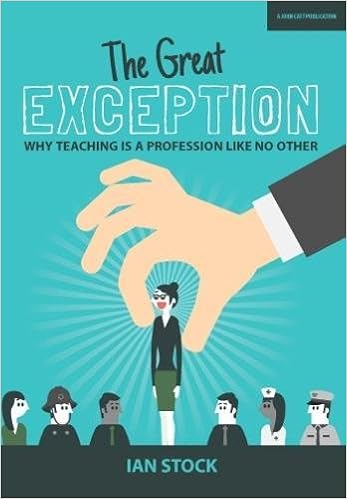
Just a reminder that my book The Great Exception – Why teaching is a profession like no other is still available here.
A teacher-reviewer described it thus:
This is a very thought provoking book. It is a challenging read, but once you get into it, it prompts you to reflect on what and how we should be teaching our children. These days, education seems to be all about exam results, but the author argues that there should be more to it than [apparent] academic success. He examines the nature of teaching and learning in depth and successfully makes a case for more autonomy for teachers, who at present, are to some extent hampered and frustrated by prescriptive guidelines on how to manage their classes. Teachers in training could learn a lot from dipping into ‘The Great Exception’.
Here is a short except:
…I want to discuss here the conflicts that the systems-approach creates in terms of what it actually means to be a teacher. The choice of words is important: to be a teacher, not simply to teach. The latter implies a specific physical activity that can, at least in theory, be defined as a discrete set of actions which can therefore be specified and measured. It also implies a recruitment process that is focused on technical proficiency that can be both easily defined for the purposes of job advertisements and judged during the recruitment process. It supposedly makes the evaluation of that process relatively easy when it comes to the whole matter of appraisal, reward and even capability proceedings. However, it overlooks the crucial matter discussed above – that much of being an effective teacher is a matter of personal qualities and characteristics that are neither easily identified nor measured. These non-cognitive qualities may be difficult to identify – but they are often the things that determine what sort of role-model an individual will make – and thereby what context they will generate within which to exercise more specific skills. As Hilary Wilce has observed, children tend to take their leads from role model behaviours not instructions – and it is for this reason that wider teacher-qualities and behaviours are so important.
That schools have to operate within a regulatory framework that promotes quantifiable, accountable decision-making is, of course, not their own fault; neither is it necessarily an undesirable thing in itself, as there clearly needs to be some mechanism for regulating these processes and identifying out-and-out malpractice. However, the presence of such defined, black-or-white prescriptions for teaching can easily cause wider issues to be forgotten under the onslaught of an officially-sanctioned ‘truth’. The ways in which such constraints are then interpreted can lead to a narrowing of job descriptions and a loss of appreciation of the actual qualities that make up a successful teacher, many of which are indeed intangible. However, the latitude for autonomy and self-determination that can be read into such frameworks by individual managements can still make matters significantly either better or worse, as suggested by the varying degrees of teacher freedom observed from one school to another.
The fact that teacher-specifications have increasingly focused on technical capability at the expense of more indefinable personal qualities may be a reaction to outside circumstances, such as the need to widen the field of potential teachers to those who perhaps lack natural talent or insight, but who are nonetheless needed on sheer numerical grounds. Likewise, anti-discrimination legislation has perhaps forced more specific criteria on those involved in recruitment. But it has nonetheless shifted general perceptions of what it is to be a teacher, from that of someone with desirable personal qualities to that of ‘mere’ technical ability.
If this seems like a rather idealistic argument, then I suggest attempting a similar exercise in drawing up a ‘job description’ for an artist, actor or indeed a spouse, and then appraising their effectiveness in finding the ideal candidate. One might also consider the effect of one’s own behaviours on the responses one obtains from such people. Teaching has often been likened to acting in terms of the qualities required to ‘hold’ a class – but a merely technical outline of the necessary requirements for being an actor do not approach an explanation of why some actors are celebrated while others spend a lot of time ‘resting’. It comes down to a unique and largely indefinable set of specific personal qualities. The same is certainly true of spouses; I cannot imagine there are many people who would consider willingly marrying someone purely on the basis of a technical description, for all that dating agencies attempt to do just that…
I am told that the chief inspector of schools Amanda Spielman has a copy. Whether it has been opened or not is, of course, another matter…


